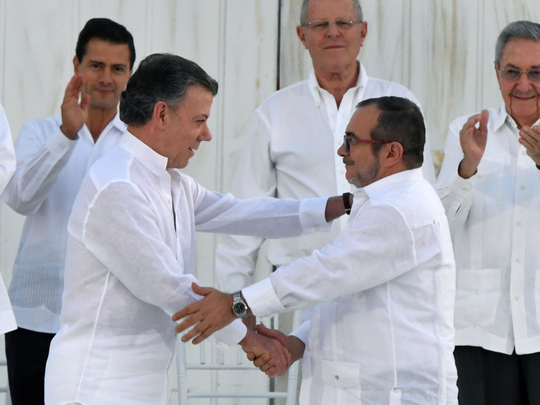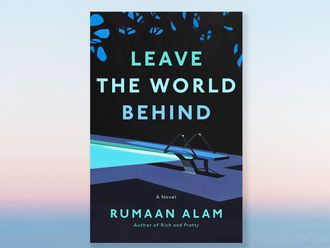
Has the prospect of peace in Colombia, a country that has seen five decades of fighting between communist guerrillas and government troops, changed the way Colombians speak to one another?
Tired of war, Colombians may be starting to shed the aggressive discourse that has been prevalent in our society.
People’s tone and words are changing as we approach the moment when we decide whether to continue this war or end it. On Sunday, we will be voting in a referendum that decides the fate of a peace deal struck between the communist Revolutionary Armed Forces of Colombia, or Farc, and the government.
By voting, we would also be deciding whether to stop or continue the language of hate and vengeance that has been pervasive in Colombia thanks to the prevalence of drug trafficking and crime.
This is no small feat. The public debate about the peace deal has protagonists who have faced each other in battle. Yet both sides are changing their discourse.
Colombian President Juan Manuel Santos has said he recognises the state’s responsibility in the murder of scores of members of the Patriotic Union, a leftist party, in the 1980s and ’90s by right-wing paramilitaries and gangsters. General Alberto Mejia, the army chief, has been telling his troops that peace is victory.
Rodrigo Londono, Farc’s supreme leader better known by the nom de guerre Timochenko, recently declared that his greatest satisfaction is to have “won peace.”
Drenched in tears, Pablo Catatumbo, another Farc commander, apologised “with sincere humility” to the families of 12 kidnapped lawmakers that Farc shot dead in 2007.
Willing to forgive?
The response of victims who have faced Farc’s violence may seem to indicate a willingness to forgive if the culprits show they are sorry. Are these signs that Colombia may become a nation whose people have reconciled?
That would be a different country from the one we’ve had so far, which the sociologist Medofilo Medina describes as one of “pervasive violence” that has engulfed mainstream social culture.
Colombia has had an “anything goes” mentality where there’s amorality, violence in personal relations, veneration of a militaristic state and celebration of paramilitaries and guerrillas. In this society, vindictive speech and deceit are the daily currency of political debate, and double standards are a virtue.
Strangely enough, in such a warped society, it was drug money that brought a semblance of order to the chaos, and offered disenfranchised people a chance to rise up the social ladder in remote abandoned districts.
One recalls comments made by a former student of the painter Daniel Segura Bonnett, who jumped out of a New York apartment in 2011. Segura, who suffered from psychiatric problems, had been viciously bullied by his students at a private school for boys in Bogota, apparently for his effeminate voice. On hearing about Segura’s death, the former student merely said, “We just decided to keep laughing.”
If this is the behaviour decades of conflict has fuelled in Colombian society, then Sunday is the day to take that first step to change it — by voting ‘yes’ to the peace deal.
— © 2016 Worldcrunch — in partnership with El Espectador/ New York Times News Service










